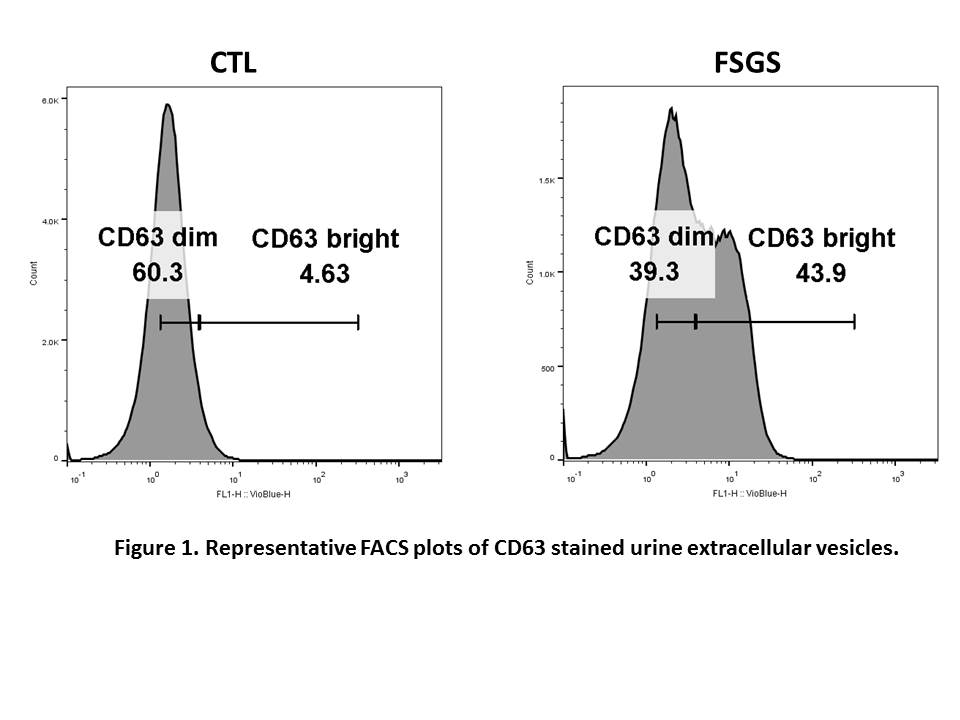Elevated Podocyte-specific Urinary Extracellular Vesicles In Patients With Fsgs Recurrence After Kidney Transplantation
University of California Irvine, Orange, CA
Meeting: 2019 American Transplant Congress
Abstract number: 258
Keywords: FACS analysis, Kidney, Machine preservation, Monitoring
Session Information
Session Name: Concurrent Session: Biomarkers, Immune Monitoring and Outcomes II
Session Type: Concurrent Session
Date: Monday, June 3, 2019
Session Time: 2:30pm-4:00pm
 Presentation Time: 3:30pm-3:42pm
Presentation Time: 3:30pm-3:42pm
Location: Room 306
*Purpose: Kidney graft failure is a major concern in patients with kidney transplantation. Patients who suffered graft failure are at a higher risk for mortality after returning to dialysis; therefore, monitoring graft function and early detection of transplant complications is crucial to maintain long-term graft function and survival. Urinary extracellular vesicles (UEVs) are currently being studied as a potential source of biomarkers due to their role as signaling molecules during both normal and diseased state. Recurrence of focal segmental glomerulosclerosis (FSGS) in the allograft occurs in 25-35 % of patients, and it is associated with poor renal allograft survival. Recent data support the hypothesis that circulating permeability factors play a crucial role in podocyte injury. This study aims to assess the level of podocyte-specific UEVs in kidney transplant subjects with FSGS recurrence using flow cytometry.
*Methods: UEVs were isolated from urine samples of control subjects (CTL) and subjects with FSGS recurrence after kidney transplantation. Isolated UEVs were stained with anti-CD63 and Annexin V to identify exosomes and microparticles, respectively. Podocyte-specific UEVs were identified using podocalyxin antibody. Stained samples were analyzed using flow cytometry. The recurrence of FSGS was confirmed by severe proteinuria and transplant kidney biopsy.
*Results: Both Annexin Vdim and Annexin Vbright microparticles were similar in control subjects and subjects with FSGS recurrence (Annexin Vdim: CTL 27.7 ± 6.7% vs FSGS 39.3 ± 10.5%, P= n.s; Annexin Vbright: CTL 15.8 ± 9.2% vs FSGS 24.7 ± 6%, P= n.s.). Urine from subjects with biopsy proven FSGS recurrence contained a higher level of CD63bright exosomes but a lower level of CD63dim exosomes (CD63dim: CTL 74.7 ± 5.1% vs FSGS 52.1 ± 6.8%; CD63bright: CTL 9.2 ± 3.0% vs FSGS 36.6 ± 5.6%; P<0.05). Podocyte-specific UEVs were elevated in subjects with FSGS recurrence in comparison to control subjects after kidney transplantation (CTL 9.5 ± 2.9% vs FSGS 24.1 ± 3.6%; P<0.05).
*Conclusions: CD63bright exosomes and podocyte-specific UEVs are significantly elevated in urine of subjects with FSGS recurrence. The results suggest that UEVs may be used as novel diagnostic markers for FSGS recurrence and other complications after kidney transplantation.
To cite this abstract in AMA style:
Lau H, Shimomura A, Tantisattamo E, Reddy UG, Dafoe D, Ichii H. Elevated Podocyte-specific Urinary Extracellular Vesicles In Patients With Fsgs Recurrence After Kidney Transplantation [abstract]. Am J Transplant. 2019; 19 (suppl 3). https://atcmeetingabstracts.com/abstract/elevated-podocyte-specific-urinary-extracellular-vesicles-in-patients-with-fsgs-recurrence-after-kidney-transplantation/. Accessed February 20, 2026.« Back to 2019 American Transplant Congress

